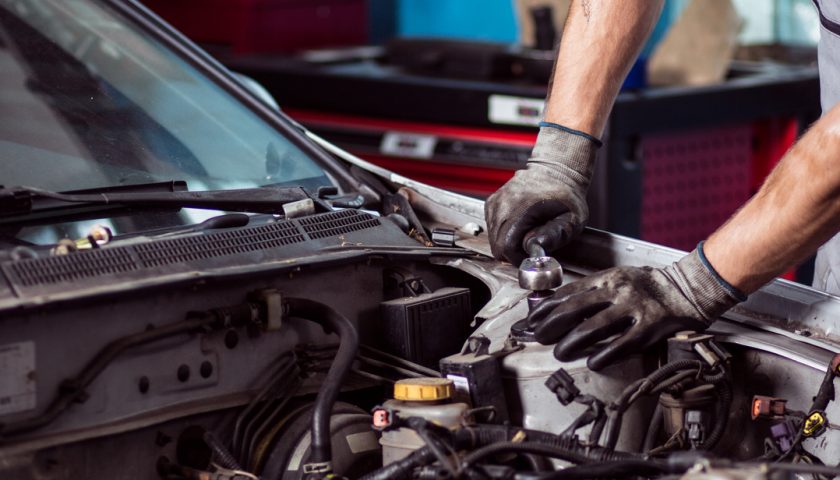Studies have shown that Audi owners are among the most satisfied of all major brands. In case you were wondering, Fiat is one of the worst in satisfaction. Of course, no car company is perfect, so you will encounter some necessary common Audi repairs.
If you suspect any noises or get the dreaded Check Engine Light, you might be able to deduce the problem just from knowing basic Audi repairs. Knowing is half the battle, this can save you a lot from having to pay for the time spent diagnosing.
You don’t need to be an expert, just look out for these common Audi issues.
1. Burning Oil Smell or Oil Spots
Oil is your car’s blood, so if you’ve got a leak somewhere, it has to be fixed quick. The longer a leak persists, the more likely it will affect other components. Not to mention, oil escaping means less oil coating your engine and it could lead to irreversible damage.
If you smell burning oil, check your dipstick to see if you’re running low. If not, then you may have a leak, likely from the valves or gasket seals. This is a common Audi problem. Leaks that show up under your car can be from a number of sources, but even the smallest leak should be looked at.
You should do a once-over around the engine block and exhaust manifold to see if any oil has leaked out.
2. Clicking Sound When Turning the Car
When you hear what sounds like metal clunking together when you turn, this is the axle struggling to move smoothly. The CV boot is the culprit here. When it gets compromised, the CV boot no longer protects the axle joint and all lubrication gets lost.
CV boots are placed on each end of a front axle, they are responsible for transferring power to the wheels from the transmission. The CV allows maneuverability at each end of the axle shaft when the car is in motion.
An Audi repair service center can spot these types of problems before the axle is beyond saving with regular maintenance. Otherwise, the axle must be replaced or rebuilt. This is one of those situations where any new noises coming from your car must be taken seriously, no matter how subtle it seems.
3. Coolant Leaks
If your coolant light comes on every few months, then you likely have a slow leak. Sometimes you can’t tell there’s a leak because the car needs to be warm enough for the leak to start. That means you may not have the tell-tale sign of colorful puddles under the car.
The coolant reservoir itself is a common Audi repair, which makes detection even more difficult for DIY’ers. Luckily, this is not an expensive repair, it just requires keeping track of how often you are replacing coolant. Oh, and it should go without saying, never ignore the coolant light or risk overheating the engine.
4. Knocking from Engine Starting
This can be a difficult repair to diagnose, but you can get some help reading through your Audi repair manual. If you start up your car and get a knocking sound, almost as if something is loose, it could be a small repair. Now, if this noise happens every time, even when you’ve just turned it off, it could be a bigger problem.
When the engine is cold and you crank it up, the camshaft adjuster needs to reach its proper tension. This is controlled by a hydraulic component that relies on oil pressure. This knocking sound only lasts as long as it takes to build the required pressure up for the camshaft.
If the noise persists for more than a few seconds, then you’ll need a mechanic to look closer at it and figure out why the camshaft adjuster is struggling. It’s unlikely that your engine is having other problems if this only occurs when it is cold out.
5. Check Engine Light
This light can indicate a number of different problems, which is both good and bad. It’s good because it’s so comprehensive, but bad because it can stress you out from not knowing. If you notice your Audi running a little harder than usual, a little louder, then it might be a problem with the engine cylinders firing.
When cylinders misfire, they cause the car to vibrate and directly impact performance. This can be noticed by a drop in RPMs or, if you’re just sitting in idle, you might even stall. If a cylinder doesn’t get its ignition spark, it misfires.
This is a common issue in Audi because they’ve had a number of bad ignition coils in the past. They’ve issued recalls on said coils, so you very well could be driving in a car with known bad coils. An Audi repair shop can check this for you and will replace the defective ignition coils for free.
DIY Common Audi Repairs or Don’t?
Some of us are lifelong gear-heads and have worked on cars long enough to handle most maintenance fine. When it comes to Audis, you may be left in the dark. Their engines are a little different, the computer information isn’t easily accessible, and it is easy to mess things up, even with common Audi repairs.
With that said, you can purchase what is called a VAG-COM. This stands for Volkswagon Audi Group – Communication, aka the tool that allows you to read the computer. Here you can do your own diagnostics, but the catch is it only works for older model Audi cars.
This is because Audi has decided to block out all information on newer model cars (some think because of the major VW-Audi emissions scandal). You’d need to rely on the sparse owner-curated information on the internet.
Performing regular auto maintenance yourself is fine, but when it comes to repairing an Audi, it’s oftentimes not worth saving a few hundred at the shop.

